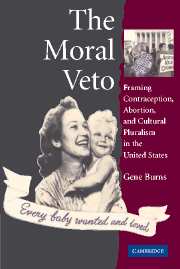Book contents
- Frontmatter
- Contents
- Acknowledgments
- 1 Introduction
- 2 Framing Contraception within Moral Worldviews: The Early, Radical Birth Control Movement
- 3 The Mainstreaming of Birth Control: A New Alliance with Eugenics and Medicine
- Dennett's Moral Worldview and the Catholic Moral Veto: Unsuccessful Frames for Contraception
- 5 Abortion before Controversy: Quiet Reform within a Medical, Humanitarian Frame
- 6 Abortion and Legislative Stalemate: The Weakness and Strength of the Medical, Humanitarian Frame
- 7 Looking Back: Limiting Frames, Moral Vetoes, and Cultural Pluralism
- Works Cited
- Index
5 - Abortion before Controversy: Quiet Reform within a Medical, Humanitarian Frame
Published online by Cambridge University Press: 21 July 2009
- Frontmatter
- Contents
- Acknowledgments
- 1 Introduction
- 2 Framing Contraception within Moral Worldviews: The Early, Radical Birth Control Movement
- 3 The Mainstreaming of Birth Control: A New Alliance with Eugenics and Medicine
- Dennett's Moral Worldview and the Catholic Moral Veto: Unsuccessful Frames for Contraception
- 5 Abortion before Controversy: Quiet Reform within a Medical, Humanitarian Frame
- 6 Abortion and Legislative Stalemate: The Weakness and Strength of the Medical, Humanitarian Frame
- 7 Looking Back: Limiting Frames, Moral Vetoes, and Cultural Pluralism
- Works Cited
- Index
Summary
Introduction
In the second half of the nineteenth century, American physicians led a movement that denounced the evils of abortion and commonly blamed women who sought abortions for moral ignorance and/or murder. Condemnation of abortion usually involved condemnation of the desire of some women to have some control over when they became mothers, and condemnation of any women who wanted a life outside of the role of homebound mother. Yet nineteenth-century feminists supported the ban on abortion, though they saw women who resorted to abortion more as victims than perpetrators.
Outside of occasional, publicized police raids of illegal abortion providers, abortion then generally disappeared from public view for nearly a century. For the most part, no one dared suggest making abortion more available. Nonetheless, when a quiet movement to liberalize state abortion laws emerged in the 1960s, for several years it met with little controversy. Furthermore, given a vastly different medical and social context, physicians had by then reversed themselves and generally favored liberalization, as did groups of legal and clerical reformers. We shall see that one of the puzzles of the history of U.S. abortion politics is that the quiet, elite movement to liberalize state abortion laws was particularly uncontroversial in the South. In recent years, the Christian Right, which opposes legal abortion and most other feminist causes, has been particularly strong in the South.
- Type
- Chapter
- Information
- The Moral VetoFraming Contraception, Abortion, and Cultural Pluralism in the United States, pp. 150 - 206Publisher: Cambridge University PressPrint publication year: 2005



